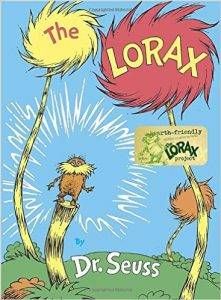
The Best Environmental Books for Readers Who Want to Save the Planet
We all started out as environmentalists. As young readers, we fell in love with classic environmental books like The Lorax by Dr. Seuss and The Giving Tree by Shel Silverstein. The Lorax spoke for the trees in the lighthearted but cautionary tale of environmental destruction brought on by unmitigated capitalism. The Giving Tree embodies the relationship between humans and nature. Like the tree, nature gives us oxygen-rich air to breathe and sustenance to help us survive. Like the boy, we continue to take from the planet’s rich resources with no regard for the future.
Some of us are still the energetic environmentalists of our youth. Others have left that life behind in the dust. Most of us lie somewhere in between, but there is still time to recapture the essence of our environment-loving youth! Although…the planet is literally engulfed in flames, so time is running short. Together, we can make The Lorax proud and save The Giving Tree. We can be the people who care a lot. Changes we make today will make the planet better for us and future generations. The following in the best environmental books will inspire readers to make changes and save the planet.
Best Environmental Books in Nonfiction
If you’re ready to save the world, but need some motivation and a road map, then these nonfiction environmental books were curated just for you.
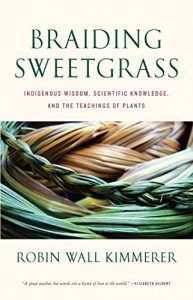 Braiding Sweetgrass: Indigenous Wisdom, Scientific Knowledge, and the Teachings of Plants by Robin Wall Kimmerer
Braiding Sweetgrass: Indigenous Wisdom, Scientific Knowledge, and the Teachings of Plants by Robin Wall Kimmerer
Everyone who cares about the environment should have Braiding Sweetgrass in their collection. It captures the reverence between indigenous people and the earth. That is the relationship we should embody in order to save the planet and save humanity. Robin Wall Kimmerer is a botanist and a member of the Citizen Potawatomi Nation.
In Braiding Sweetgrass, Kimmerer draws on her life as an indigenous woman and scientist and shows how other living things around us offer gifts and lessons. Plants and animals are our oldest teachers. As “the younger brothers of creation,” humans must awaken our ecological consciousness. We must offer our thanks to these other beings in return.
Choked: the Age of Air Pollution and the Fight for a Cleaner Future by Beth Gardiner
Air pollution kills more people than smoking, AIDS, diabetes, and traffic accidents combined. It is strongly linked to numerous ailments including strokes, heart attacks, cancers, dementia, and premature births. Over 40% of Americans and nearly 95% of people worldwide breathe polluted air every day.
In Choked, Beth Gardiner, an American journalist living in London, travels the world to tell the story of this invisible plague. Scientists share pollution’s effects on the body as ordinary citizens fight for a cleaner future.
Downriver: Into the Future of Water in the West by Heather Hansman
The Green River supplies water to nearly 33 million people. Moreover, The Green is overused and at risk of depletion as the West gets hotter and drier each year and more people depend on The River’s resources. In Downriver, environmental columnist Heather Hansman weaves journalistic research about the river’s history and current threats into the story of her solo pack-raft trip from Wyoming to Utah along the Green River.
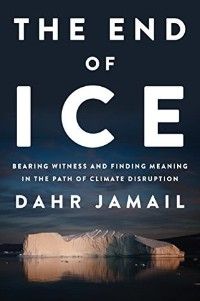 The End of Ice: Bearing Witness and Finding Meaning in the Path of Climate Disruption by Dahr Jamail
The End of Ice: Bearing Witness and Finding Meaning in the Path of Climate Disruption by Dahr Jamail
This book, inspired by the rapidly receding glaciers of Denali National Park, brings together the author’s personal introspection and interviews with leading climate change experts. However, The End of Ice is not for the faint of heart. Readers will not find calls for technology-based solutions or policy changes to save us. Instead, Jamail relies on his firsthand knowledge to inspire a call to action against our current climate crisis and to reconnect with our planet.
Falter: Has the Human Game Begun to Play Itself Out? by Bill McKibben
Thirty years ago, Bill McKibben was one of the first to sound the warning about climate change in the groundbreaking classic The End of Nature. In Falter, McKibben expands on that previous bold proclamation. He declares the whole breadth of human existence is in jeopardy. According to McKibben, not only is climate change shrinking our inhabitable space, the rise of new technologies like artificial intelligence and robotics is exacerbating our demise. Despite the book’s bleakness, McKibben does draw on his work in building 350, the global movement to combat climate change, to offer solutions to save both the planet and humanity itself.
Global Warming and the Sweetness of Life: A Tar Sands Tale by Matt Hern (Author), Am Johal (Author), and Joe Sacco (Illustrator)
Authors Hern and Johal embark on a road trip from socially liberal and consciously “green” Vancouver to the tar sands of northern Alberta, home of the world’s most industrial site. In Global Warming, they talk to the people whose lives and livelihood depend on or are imperiled by the extraction of oil from Alberta’s reserves. Along on the journey is friend and illustrator Joe Sacco. Sacco contributes insights, illustrations, and a comic about the contradictions of life in an oil town.
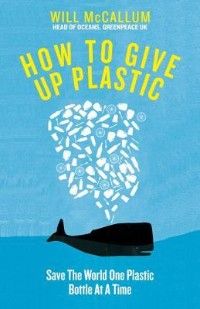 How To Give Up Plastic: A Guide to Changing the World, One Plastic Bottle at a Time by Will McCallum
How To Give Up Plastic: A Guide to Changing the World, One Plastic Bottle at a Time by Will McCallum
Every year, about 8 million metric tons of plastic is dumped into our oceans. Over time, these plastics break down into microplastics, which are even harder to remove. By 2050, there could be more plastic in the ocean than fish by weight. Will McCallum, Head of Oceans at Greenpeace UK, wrote How to Give Up Plastic for those who are ready to kick the plastic habit. Tips to help readers #BreakFreeFromPlastic range from replacing shampoo bottles with shampoos bar to lobbying supermarkets to eliminate plastic packaging.
Inconspicuous Consumption: The Environmental Impact You Don’t Know You Have by Tatiana Schlossberg
In Inconspicuous Consumption, former New York Times science writer Tatiana Schlossberg wants readers to stand up to climate change and pollution by making simple but impactful choices every day. When most of us think of climate change, we think of melting ice caps, massive flooding, and devastating forest fires. We may even think about air pollution and greenhouse gases, but we might not consider our everyday habits like a streaming marathon, enjoying a hamburger, or cranking the air conditioner.
In fact, it is our daily activities and the way we use resources and create waste that seriously impact climate change. With knowledge and wit, Schlossberg seeks to empower readers to make more informed choices as consumers. We all have to work together in order to solve this massive climate crisis.
No One is Too Small to Make a Difference by Greta Thunberg
Thanks to her School Strike for the Climate in August 2018 and her continued environmental activism, Greta Thunberg has become a household name. No One is Too Small is a collection of Thunberg’s speeches on global warming and climate change including Our House is on Fire, I’m Too Young to Do This, and Our Lives are in Your Hands.
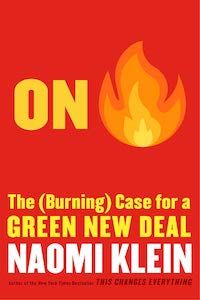 On Fire: The (Burning) Case for a Green New Deal by Naomi Klein
On Fire: The (Burning) Case for a Green New Deal by Naomi Klein
In On Fire, Naomi Klein, the woman who environmentalist Bill McKibben calls the Intellectual Godmother of the Green New Deal, is not here to make us feel better. On Fire is a collection of Klein’s essays on climate change over the past decade as well as new material on the high stakes and potential consequences of our political and economic choices.
These essays detail the planet’s slow death from the “rotting underwater mass grave” that is the Great Barrier Reef to the children of the Democratic Republic of Congo whose “lungs are filled with dust from mining cobalt for the phones that have become extensions of our arms.” As climate change literally has parts of the world on fire, the current state of politics, xenophobia, misogyny, and fascism only exacerbate the crisis. Klein sees the battle for a greener world as the fight of our lives. Klein’s Green New Deal may be the bold climate action we need to create a just and thriving society.
Rising: Dispatches from the New American Shore by Elizabeth Rush
Winner of the Outdoor Book Award and lauded as “the book on climate change and sea levels that was missing” by the Chicago Tribune, Rising is a guide through the many places along the United States coastlines where climate change is a clear and present danger. From the Gulf Coast and the shores of Miami to New York City and the Bay Area, for the plants, animals, and people who call these places home, there are only two options: “retreat or perish in place.” Rising offers firsthand testimonials from those facing those choices along with profiles of the environmentalists and activists fighting for change.
Signs on the Earth: Islam, Modernity, and the Climate Crisis by Fazlun Khalid
Similar to the way Naomi Klein’s This Changes Everything presented the need for environmental change in the framework of Capitalism, Fazlun Khalid’s Signs on the Earth brings that narrative to the Islamic faith. Khalid argues consumerism, industrialization, and the unsustainable addiction to economic growth need to be rethought. His radical reconstruction of prevailing systems draws inspiration from sacred Muslim tradition. However, Khalid recognizes that environmental concerns are a collective responsibility. He calls on people from all faiths and none to work together to leave a healthy planet for future generations.
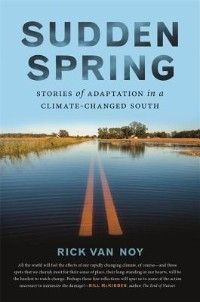 Sudden Spring: Stories of Adaptation in a Climate-Changed South by Rick Van Noy
Sudden Spring: Stories of Adaptation in a Climate-Changed South by Rick Van Noy
Rick Van Noy is not a scientist who studies climate change. He is just a concerned citizen who wants to understand its impact. Van Noy drives through the south stopping along major cities like Charleston, New Orleans, and Houston to witness what rising sea levels and storms have done to these cities for himself. Through personal observations and interviews with local officials and residents, Van Noy highlights how many Southern communities are adapting to the impacts and challenges of a warmer climate.
Sustainability Made Simple: Small Changes for Big Impact by Rosaly Byrd and Laurèn DeMates
From the founders of The Sustainability Co-Op comes a great introduction on how to live more sustainably in order to help the planet. In Sustainability Made Simple, Byrd and DeMates offer realistic guidance to readers who are looking for relatively easy ways to incorporate sustainability into their daily lives without making drastic life changes. Their practical advice includes information on how to find out what is recyclable in your town and ways to conserve energy and reduce e-waste. These simple yet transformative changes provide the opportunity for anyone to practice sustainability. Action taken now will improve the lives and health of our communities and our planet.
A Terrible Thing to Waste: Environmental Racism and its Assault on the American Mind by Harriet Washington
Poor people of color are often disproportionately harmed during environmental crises. In A Terrible Thing to Waste, Washington argues the negative effect of this environmental racism leads to cognitive damage that is robbing communities of color and America as a whole of intellectual power. Although IQ is a biased and flawed metric, it is useful for tracking cognitive damage. Washington uses extensive scientific research to show the reported Black-White IQ Gap is most likely caused by environmental racism. Additionally, Washington provides potential solutions to solve this devastating problem.
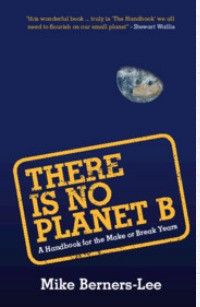 There is No Planet B: A Handbook for the Make or Break Years by Mike Berners-Lee
There is No Planet B: A Handbook for the Make or Break Years by Mike Berners-Lee
The challenge of tackling the crisis of climate change is immense. We know climate change is destroying the planet. We still don’t know the best method to fight it. Also, we do not know where to start. Mike Berners-Lee has analyzed the data and crunched the numbers. In There is No Planet B, Berners-Lee presents a course of action that is both practical and enjoyable including alternative food choices that reduce emissions and alternative energy options that keep fossil fuels in the ground.
The Unlikely Thru-Hiker: An Appalachian Trail Journey by Derick Lugo
Derick Lugo is a black man from the city who is unfamiliar with the outdoors and hiking culture. With a can-do attitude and an extremely overweight backpack, he sets off to conquer the infamous Appalachian Trail. Throughout his journey, Lugo perseveres with tenacity, humor and a commitment to grooming that earns him the trail name “Mr. Fabulous.”
Although Lugo’s story doesn’t directly related to the fight against climate change, hikers on the Appalachian Trail can participate in the Appalachian Mountain Club Mountain Watch Program. The main purposes of the program are to gain a better understanding of how climate change is affecting plants on the trail, to increase public awareness, and to promote conservation.
Visionary Women: How Rachel Carson, Jane Jacobs, Jane Goodall, and Alice Waters Changed Our World by Andrea Barnet
Visionary Women is the story of four women who shaped the world in which we live today by standing against corporate culture and its war on nature. Jane Jacobs fought for livable cities and strong communities. Jane Goodall showed the kinship between humans and animals. Rachel Carson warned us about the adverse effects of pesticides in the classic environmental book Silent Spring. Alice Waters encouraged us to improve our eating habits. Together, these women changed the course of history. Their work offered people a new way to look at and live in the world.
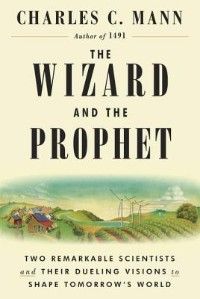 The Wizard and the Prophet: Two Remarkable Scientists and Their Dueling Visions to Shape Tomorrow’s World by Charles Mann
The Wizard and the Prophet: Two Remarkable Scientists and Their Dueling Visions to Shape Tomorrow’s World by Charles Mann
In The Wizard and the Prophet, award-winning author Charles Mann reveals the diametrically opposed views of two little-known 20th century scientists that helped shape our ideas about the environment. Nobel-winning agronomist William Vogt believed that abusing the planet’s resources would ruin us. His mantra was “Cut back! Otherwise everyone will lose!”
On the other hand, Norman Borlaug championed innovation to overcome Earth’s limits as the only way we can all win. Borlaug’s research saved millions from starvation by producing high-yield crops. Mann explores the effects of these diverging viewpoints on humanity’s greatest challenges with journalistic analysis and historical context.
Fiction Books About the Environment
If you want to read some of the best environmental books, but prefer a fictionalized version, then the following list is for you.
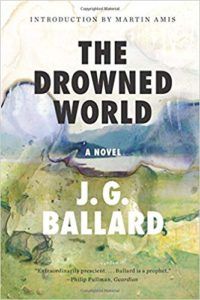 The Drowned World by J.G. Ballard
The Drowned World by J.G. Ballard
In 2010, Time Magazine named The Drowned World one of the top10 best post-apocalyptic books. The novel has also been deemed as a founding text in literary genre of climate fiction.
In 2145, global warming has melted the ice caps. Tropical temperature, flooding, and accelerated evolution has made London unrecognizable and mostly uninhabitable. Biologist Dr. Robert Kerans and his team of scientists confront a cityscape where nature is on the rampage.
The Monkey Wrench Gang by Edward Abbey
When George Hayduke returns home from war, he is devastated by the threat of environment destruction in the American Southwest. Hayduke joins a band of three other misfits to create The Monkey Wrench Gang. The others members are radical feminist Bonnie Abzug, wilderness guide and outcast Mormon “Seldom Seen” Smith, and wealthy surgeon Doc Sarvis. Together, The Monkey Wrench Gang is ready to destroy any structure that threatens their beloved natural habitat.
Salvage the Bones by Jesmyn Ward
Winner of the National Book Award, Salvage the Bones follows an impoverished family in the days leading up to Hurricane Katrina. Esch lives in the coastal town of Bois Sauvage, Mississippi with her three brothers and their alcoholic and widowed father. As a hurricane builds over the Gulf of Mexico, Esch’s family and community must come together against all odds.
Looking to read more environmental books? Check out:
Books About Climate Change Solutions



